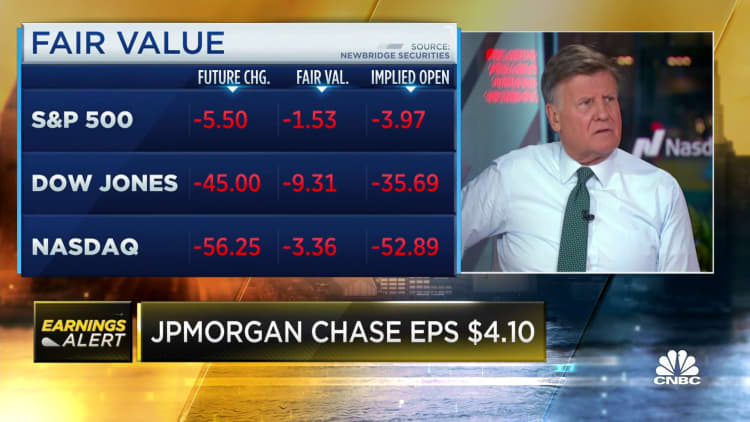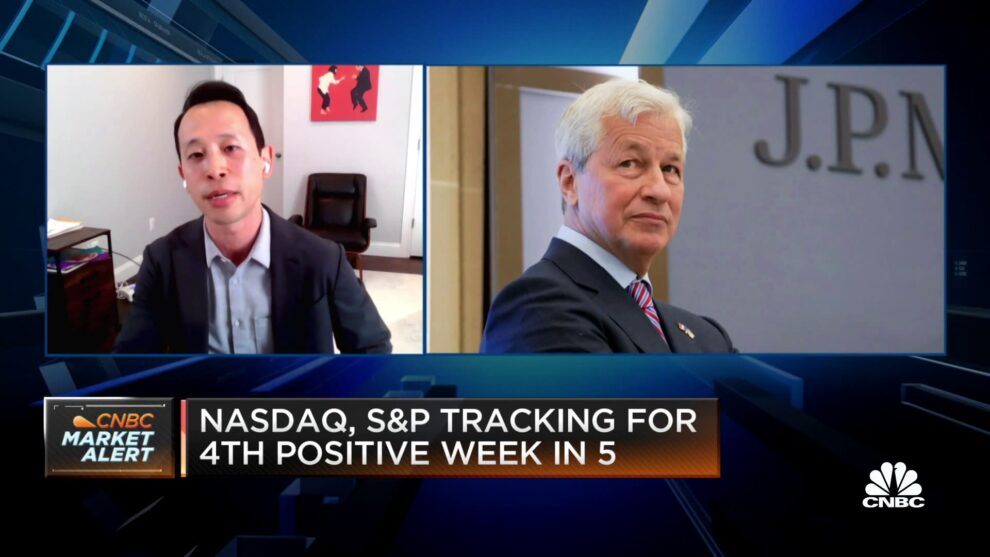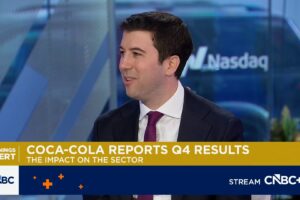
JPMorgan Chase posted record first-quarter revenue on Friday that topped analysts’ expectations as net interest income surged almost 50% from a year ago on higher rates.
Here’s what the company reported:
- Adjusted earnings: $4.32 per share vs. $3.41 per share Refinitiv estimate
- Revenue: $39.34 billion, vs. $36.19 billion
The bank said profit jumped 52% to $12.62 billion, or $4.10 per share, in the first three months of the year. That figure includes $868 million in losses on securities; excluding those losses lifts earnings by 22 cents per share, resulting in adjusted profit of $4.32 per share.
Companywide revenue rose 25% to $39.34 billion, driven by a 49% rise in net interest income to $20.8 billion, thanks to the Federal Reserve’s most aggressive rate-hiking campaign in decades. That topped analysts’ expectations for interest income by more than a billion dollars.
The bank also boosted a key piece of guidance that bodes well for the near future: Net interest income will be about $81 billion this year, about $7 billion more than their previous forecast of $74 billion, CFO Jeremy Barnum said Friday.
The change was mostly driven by expectations that JPMorgan will have to pay less to depositors later this year if the Fed cuts rates, he said.
Shares of the bank popped 7.5% in midday trading.
“The U.S. economy continues to be on generally healthy footings — consumers are still spending and have strong balance sheets, and businesses are in good shape,” CEO Jamie Dimon said in a release.
“However, the storm clouds that we have been monitoring for the past year remain on the horizon, and the banking industry turmoil adds to these risks,” he said, adding that the industry could rein in lending as banks become more conservative ahead of a possible downturn.
Money in, money out
JPMorgan, the biggest U.S. bank by assets, is watched closely for clues on how the industry fared after the collapse of two regional lenders last month. Analysts had expected JPMorgan to benefit from an influx of deposits after Silicon Valley Bank and Signature Bank experienced fatal bank runs.
Indeed, JPMorgan saw “significant new account opening activity” and deposit inflows in its commercial bank, Barnum said.
The money flows implied “an intra-quarter reversal of the recent outflow trend as a consequence of the March events,” Barnum said. “We estimate that we have retained approximately $50 billion of these deposit inflows at quarter-end.”
That helped cushion a larger trend of customers pulling money out of the regulated banking system as they realize they can earn higher yields in places like money market funds.
JPMorgan saw a 7% decrease in total deposits from a year ago to $2.38 trillion, slightly better than the $2.31 trillion estimate of analysts surveyed by StreetAccount. But, thanks to the recent inflows, deposits actually climbed 2% when compared with the previous quarter.
Slow to act
While commercial clients have been pulling deposits for the past year as rates rose, retail customers have been far slower to act. Now, it looks like Main Street customers have been seeking higher yields; deposits in the bank’s giant retail banking division dropped 4% in the first quarter.
Banks have also begun setting aside more loan loss provisions on expectations for a slowing economy later this year. JPMorgan posted credit costs of $2.3 billion, roughly in line with the StreetAccount estimate, as it built reserves by a net $1.1 billion and booked $1.1 billion in net loan charge-offs.
JPMorgan’s fixed income trading business also helped the bank beat expectations, posting $5.7 billion in revenue, or about $400 million more than expected. Equities trading revenue of $2.7 billion was below the $2.86 billion estimate.
Investment banking remained weak thanks to IPO markets that are still mostly closed, with a 24% decline in revenue to $1.6 billion, just below the $1.67 billion estimate. Barnum said in February that investment banking revenue was headed for a 20% decline from a year earlier.
Dimon’s thoughts
Finally, analysts will want to hear what Dimon has to say about the economy and his expectations for how the regional banking crisis will develop. JPMorgan has played a central role in propping up a client bank, First Republic, which teetered last month, in part by leading efforts to inject it with $30 billion in deposits.
Another key question will be whether JPMorgan and others are tightening lending standards ahead of an expected U.S. recession, which could constrict economic growth this year by making it harder for consumers and businesses to borrow money.
Shares of JPMorgan are down about 4% this year before Friday, outperforming the 31% decline of the KBW Bank Index.
Wells Fargo and Citigroup also topped analyst estimates for revenue Friday. Still ahead are Goldman Sachs and Bank of America results on Tuesday, while Morgan Stanley discloses earnings Wednesday.












